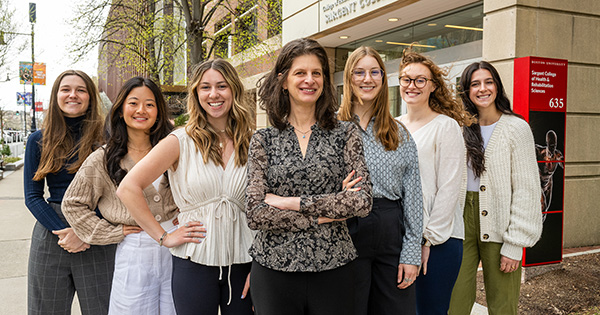Sargent Occupational Therapy OTD Students Present Best Practices at Annual Conference of New York Sexual Assault Counselors and Victim Advocates
Note: This article uses identity-first language (“disabled person”) to align with the preferences of many in the disability self-advocacy community. We recognize that some people prefer person-centered language (“disabled person”).
According to the US Department of Justice, people with disabilities are four times more likely to be sexually assaulted in their lifetime than people without disabilities, and they are also less likely to report it.
To help New York State sexual assault victim advocates better assist people with disabilities who have been assaulted in filing reports, six occupational therapy (OT) doctoral students from the Sargent College of Health & Rehabilitation Sciences will be researching this issue and presenting their findings via Zoom at the New York State Coalition to Prevent Sexual Assault (NYSCASA) annual conference on May 14, 2024.
Each student will research and present on a different disability category, including intellectual disability, developmental delay, physical disability, hearing impairment, visual impairment, severe mental illness, etc. Students will define each disability, discuss its prevalence, outline specific considerations when supporting victims with a particular disability, and provide advocates with resources for further learning.
“There’s a lot of information out there about sexual assault in general, but when it comes to sexual assault and disability, we want to help people not lump people with disabilities together,” said Gia Baldassano (Sargent’25), whose presentation focused on victims with physical disabilities. “For example, someone who is blind may have different support needs than someone with Down Syndrome.”
There’s a lot of information out there about sexual assault in general, but when it comes to sexual assault and disability, we want to help people not to lump people with disabilities together – for example, someone who is blind may have different support needs than someone with Down’s syndrome.
Gia Baldassano (Sergeant ’25)
Ann Cunningham (Sargent ’25) will speak about the need for advocacy for victims with intellectual disabilities. She says that people with disabilities, especially those with intellectual disabilities, are sometimes stereotyped as asexual, which can make it even harder for them to recognize that they have been abused and even harder for them to seek help.
“I feel that we cannot emphasize enough the need for comprehensive sex education that is accessible to adults, not just people with disabilities. [also to] “All youth and all people in general,” Cunningham said.
The opportunity for a Sargent doctoral student to speak arose from a conversation between NYSCASA Interim Executive Director William Rivera and Sargent Professor and Occupational Therapy Department Chair Emily Rothman. The conversation was about one of Rothman’s research studies on counseling autistic sexual assault victims at the university. Rivera expressed an interest in speaking on the topic at a 2024 training for advocates and counselors for sexual assault victims. Rothman immediately thought of her own student.
“I told Will that I knew a lot of students who were really passionate about getting information out there about how to help people with disabilities and who were also really passionate about preventing sexual violence, so I thought this would be a really good fit,” Rothman says.
Rothman organized a group within an hour of sending an email to 42 first-year OT doctoral students seeking six volunteers to help with the presentation. The students were passionate about caring for assault victims in the disability community, and agreed to help, even though they weren’t paid, Rothman said. Several of the students even reached out to individuals with experience of disability to help put together their own sections of the presentation.
“I’m so impressed and grateful for the students,” Rothman said. “As a teacher, one of the great things about this opportunity is that we’ve found a way to take advantage of the raw energy and enthusiasm that our students bring to the table as they tackle real-world challenges. It’s where we’re bringing our best selves as teachers, as learners, and as community members. I’m seeing my students learn by leaps and bounds because they’re learning by doing, so it’s a win-win all around.”
View related topics:

